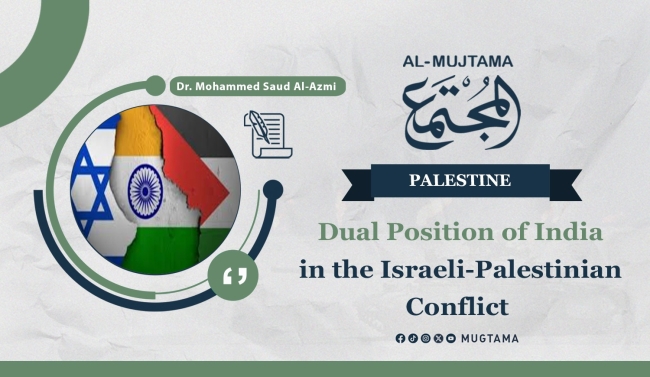Dual Position of India in the Israeli-Palestinian Conflict
Historically, India has focused on foreign policies that blend cooperation with various regional and international parties, reflecting its interactions with diverse regional and global challenges.
India's Historical Position with Palestine
India was the first non-Arab country to recognize the Palestine Liberation Organization (PLO) as the sole legitimate representative of the Palestinian people in 1974. It was also among the first countries to recognize the State of Palestine in 1988. In 1996, India opened its official office for the Palestinian Authority in Gaza, later relocating it to Ramallah in 2003.
Earlier last month, India's Permanent Representative to the United Nations, Ambassador Ruchi Ghanashyam, expressed hope for reconsideration of Palestine's request for membership in the United Nations despite the Security Council veto. She affirmed that the additional rights and privileges of Palestine's participation would come into effect from the seventy-seventh session of the General Assembly in September of this year.
Enhancing Relations with Israel
On another front, India refrained from directly criticizing Israel for its actions in Gaza, strengthening long-standing relations between the two countries under Prime Minister Narendra Modi's government. However, the Indian Ministry of External Affairs called for an agreement on ceasefire and expressed support for a two-state solution. India also showed openness towards another form of support for Israel: recruiting and sending thousands of workers to boost the Israeli economy, after Netanyahu's government banned tens of thousands of Palestinian workers.
Amid recent developments in the Israeli-Palestinian conflict, India's positions have sparked widespread speculation among global analysts and the international community. While India has consistently expressed support for Palestine and consistently voted in its favor in international organizations, reports have also surfaced indicating military support for Israel. This has raised questions about the consistency of India's foreign policy.
Reports suggest that India supplied advanced drones and other weaponry to Israel, manufactured in Hyderabad. According to the Hebrew newspaper "Yedioth Ahronoth," this factory, established in partnership between Israel's defense company "Elbit Systems" and Indian businessman Gautam Adani, converted 20 drones for use by the Israeli army due to shortages during the conflict in February.
This Hyderabad facility represents the first factory outside Israel to produce these drones, highlighting deep military ties that may enhance strategic and commercial cooperation between the two countries. However, this move contrasts with India's traditional policy of supporting the Palestinian cause and adhering to humanitarian and international principles.
It's important to understand that India's stance is not merely a bilateral issue between Israel and Palestine, but part of its comprehensive foreign policy influenced by multiple strategic and economic factors. Nevertheless, this duality in stance may cause concern among the global public and analysts, especially amidst escalating geopolitical tensions in the region.
These decisions are likely to be endorsed at the highest levels in India, given Israel's prominent role as a weapons supplier to India. This step coincided with other reports indicating India's provision of artillery shells and weapons to Israel since the beginning of the conflict, reflecting the strategic benefits of the partnership between the two countries, according to Israeli sources.
Statement by the Former Ambassador
Former Israeli Ambassador to India, Daniel Carmon, clarified that India's support for Israel during its conflict with Gaza might be seen as a gesture of gratitude for Israel's assistance during the Kargil War in 1999. In an interview with Israeli news outlet Ynetnews, Carmon emphasized Israel's unique support for India during those unforgettable conflicts, which India might be reciprocating today.
These diplomatic moves coincide with other reports that India provided Hermes 900 drones, manufactured in Hyderabad, to Israel. However, India has not officially confirmed these reports or responded to Carmon's statements yet.
In May, Spain prevented the cargo ship Marianne Danica from docking at the port of Cartagena on its way to Israel. Ynetnews reported that the ship, coming from Chennai, was carrying 27 tons of military supplies.
"Long Live Palestine" Slogan Sparks Political Controversy in India
Asaduddin Owaisi, President of the All India Majlis-e-Ittehadul Muslimeen (AIMIM) and Member of Parliament from Hyderabad, sparked a wide controversy after ending his oath-taking speech with the slogan "Long Live Palestine." This slogan followed chants of "Long Live the Dalit Class" and "Long Live the State of Telangana," provoking mixed reactions in political and media circles.
The day after the oath-taking, two complaints were filed against him; the first by lawyer Hari Shankar Jain for his slogans in the assembly, and the second by lawyer Vineet Jindal under Article 103 of the Indian Constitution to the President of India, demanding Owaisi's disqualification under Article 102(1)(d) for allegedly showing allegiance to a foreign state, namely Palestine.
Despite the removal of his statements from the council's records, Owaisi defended himself, saying he saw no wrong in saying, "Jai Bhim, Jai Meem, Jai Telangana, Jai Palestine," noting that other members also express diverse opinions. He added that the Palestinian people are oppressed, citing Mahatma Gandhi's words about Palestine.
This incident occurs within the context of the Indian government's wavering stance on the Palestinian issue. Despite India's historical support for Palestine, the current policies show contradictions, raising questions about India's true position and the duality of its stance. These diplomatic contexts come at a time of increasing geopolitical tension in the Middle East, making India's balance between supporting Palestine and Israel a sensitive and complex matter that requires careful future management of its foreign policy.
In conclusion, India must find a balance between international cooperation and adherence to ethical principles and human rights in shaping its foreign policy. Avoiding double standards is essential to maintaining its credibility and enhancing its role as a supporter of peace and stability in the region. India should focus on supporting sustainable political solutions to the Israeli-Palestinian conflict and work earnestly toward achieving a fair settlement that reflects the aspirations of both peoples and respects human rights. Through this balanced and responsible approach, India can effectively contribute to building a more stable and secure future for everyone in the region.
-------------------------------------------------------------


